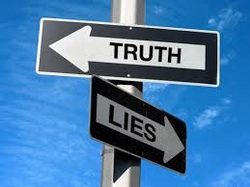
A simple example of this is driving. When you drive you must discern what is going on around you. The interaction of the traffic and what each drivers intentions are. You discern the signs along the road and that information helps you make accurate decisions about where you are now, where you are going to, and how best to get there. This is common every day "discernment".
"Deception" on the other hand, is defined as "a ruse", "a trick" or "the use of deceit". "Lying", "misleading", "misconstruing", "misunderstanding", "spinning" (slanting a particular story or event to fit your agenda), are all common forms of deception. You and I deal with deception every day. Each of us is either "deceiving" or "discerning" the flow of information and events throughout our day.
Many times we are not even consciously aware of our own deceptions that we perpetrate on others. At other times the deception is both deliberate and pre-meditated. Those "little white lies" we tell are small deceptions. The more egregious examples are deliberate media deception, "propaganda" that can be perpetrated on either side of any given issue, in an attempt to influence or control the general population. Human beings really want to be "right" and they are usually willing to lie if necessary, to appear to be "right" on some issue.
The one group of people that Jesus most despised was those who were deceivers. Jesus had superior discernment ability. He could "see" or "discern" what was in someones heart and mind. When asked about the signs of his second coming, in Matthew chapter 24, Jesus proceeds to list a lot of things that were going to happen. The first one he mentioned was "deception". He warned "take care that no one deceive you..."
He clearly felt that deception in the church was going to become a major threat. But his warning is also a general principle of life, that can save us from much heartache and major mistakes. We all need the ability to discern truth from lies and recognize how your life choices you make today will influence your life for many years to come.
The challenge lies in the fact that deception can be presented in such a way as to make it very attractive to the "bait". Take for example Charles Ponzi, the inventor of what we call today, "the Ponzi Scheme". A deception which originated in 1919, in which investors appeared to be making big returns on money they invested with Charles Ponzi. But Ponzi was spending their money, not investing it. He was deceiving these investors into believing that they could make big money by investing with Charles. But it was all a big lie. He was simply taking money from new investors and using it to pay "returns" to the earlier investors, then spending the rest. Ponzi defrauded and deceived dozens of investors before the scheme collapsed, destroying the fortunes of those who were deceived by him.
Why were they deceived? Why didn't they "discern" that Ponzi was not really earning the money he told his investors they would earn? Most deception and fraud is disguised to look like something good, something you really want or something you really need. When the bait looks tempting, the fish are going to bite. Deceivers often present an opportunity or benefit that is so tempting that the "bait" (that's you), cannot "afford to turn it down".
Bernie Madoff was so deceptive in creating his aura of success and power around his own ponzi scheme that he was able to entice even major corporations and wealthy, knowledgable investors to give him billions of dollars. His was the largest financial deception ever perpetrated by an individual. It was nothing more than a deception disguised as wealth and power. Madoff's greatest deception was his ability to make everyone believe that it was "prestigious" to invest with him. People will often make terrible mistakes in judgement in order to satisfy their pride and ego. Investing with a powerful, successful "guru" like Bernie Madoff was a status symbol. And though it worked for some 30 years, events beyond Madoff's control eventually exposed this "investing guru" as a mind boggling web of deception.
Learning to discern the difference between truth and deception requires that we get beyond ourselves and our own ego. We must stop making choices based on what is stroking our ego or promising to immediately satisfy our biggest needs or desires. We must learn to examine the "bait" carefully, before we "bite it". If we are not so quick to "take the bait" and make the effort to understand what is happening and why, we can avoid deception.
Avoiding deception can be challenging. Our hearts and minds can rationalize us into a bad decision if we have not yet developed discernment. Avoiding deception is the essence of freedom. A nation that is deceived by it's leaders is a nation that has been enslaved by them. On a more personal level, seeking truth is the essence of foundation building for success in life. Learn to discern or you will be deceived.
